Pastor Mark Benn described Patentia as “a peaceful community with not much incidents of crime; whatever exists is petty crime… The people are harmonised and there is a good rapport among them.”
“I enjoy living here; the neighbourhood is a good, quiet place. Most people get along well,” one resident told Stabroek News.
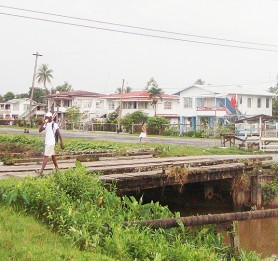
Patentia has six churches, a temple and a mosque.
For seventy-five per cent of Patentia’s inhabitants, the Wales Sugar Estate is their lifeline. Many of them are cane harvesters while the others are artisans. Outside of the estate, there are not many employment opportunities. Those who are not employed in sugar own shops, operate taxis, are teachers or provide some other service, but the school leavers mostly opt to seek employment in Georgetown.
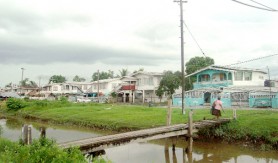
Spending is dictated by the grinding of sugar cane at the estate. During the season, money flows, but in the off season which lasts for three months, spending is reduced and business in the community is slow.
Social issues
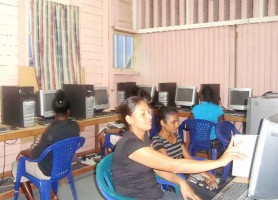
Being affiliated with the estate economy can give rise to social problems such as those of domestic violence and alcohol abuse. Pastor Benn, who has headed the Patentia Full Gospel Fellowship Church for the past four years, expressed the view that the abuse of alcohol was a product of the long hours worked at the estate and the practice of consuming after leaving there. He said that the churches had made interventions to promote behavioural change, explaining that years ago the incidence of alcohol abuse was high and often manifested
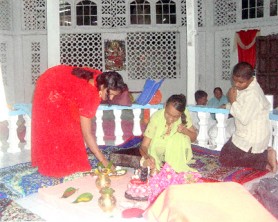
itself in domestic violence. It was this which caused the church to intervene and begin to work with members who abused their wives.
A few months ago, Pastor Benn’s church held a programme at the community centre which was attended by approximately fifty persons. It was facilitated by a social worker who discussed domestic violence and alcohol abuse.
As a consequence of the sessions he noted there had been changes in behaviour. However, the problem still existed. While the area has no rum shops, the local stores sell alcohol, and as one resident described it, “There is take away,” and residents do much of their drinking at home.
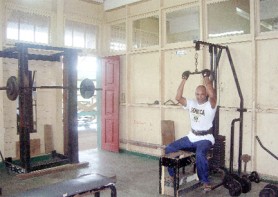
While the initiatives on alcohol abuse and domestic violence had some success, Pastor Benn said that there still needed to be more programmes to deal effectively with the problems and effect behavioural change.
Meanwhile, Pandit Persaud who has been officiating at the community’s only Mandir for the past thirty-five years said that there was not a high rate of alcoholism in the community. He agreed that it was normal practice for persons to imbibe at home or at barbeques in the area, however, he still did not think that abuse was a major problem. While there had been instances where he had had to intervene in domestic disputes, he said that these were not connected to alcohol use.
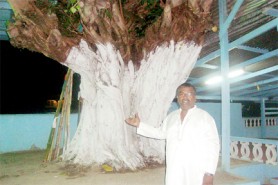
Of particular concern to him was the underage drinking and smoking among youths because they had easy access to alcohol. “But even as an elder if you try to correct them, they ignore you,” he said. He believes that youths had too much freedom and more needed to be done to instil discipline in them.
Water
Water for homes is sourced from a GWI well located at Vriesland. Of those residents spoken to, they said that the water supply was good most of the time, although there were times when it flowed sparingly. However, the quality of the water was sometimes an issue. Allison Forrester said “the water is not good; sometimes you can’t even cook with it… it’s red.”
Constant blackouts are not a problem. Even when there are power outages, they usually last only about 15-20 minutes.
Schools
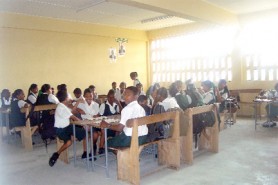
In the front of the village the nursery, primary and secondary schools can be found. At the mid-morning school break, the eldest children can be seen buying snacks from the vendors outside their school. By lunch time, the smallest children make their way home.
The Wales Community High School and the Patentia Secondary School were merged in September and accommodate 1400 children. One teacher said that the combining of the schools had caused transition problems. She explained that every school had its own culture and it would take some time for the children to adjust to the changes. It was reported that a common sight was fighting among students. The school is staffed by fifty-seven teachers. Owing to the increase in numbers, there was the need for more furniture and washrooms.
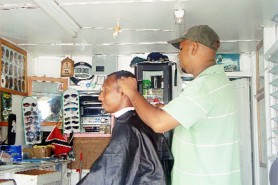
Residents said that there were no major incidents of crime, although petty crime was common. One resident complained, “They steal anything they can put their hands on.” The community policing group which was resuscitated this year is said to be very active. Alternatively, reports can be made to the Wales Police Station.
Health
The community has no health centre of its own, but the neighbouring one on the Wales estate can be accessed, although it is used mainly by the estate employees. Residents make the most of the various medial outreaches to the community, and at other times journey to Good Intent, the West Demerara Regional Hospital or any health post located within the region. There is also a private doctor who holds his clinic once a fortnight.
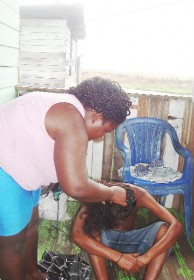
“The hospital needs drugs” said Allison Forrester after arriving home from the Diamond Diagnostic Centre. As she sat on the stairs, she cradled her sick three-year-old daughter. With frustration evident in her voice, she said, “They give me a prescription to go buy medication. If me nah got money wah me gun buy with?” She said that she had visited several health centres along the West Bank but none had medication to help her child. Going to Diamond was her last resort.
Squatting area
Life in the squatting area of Patentia is different. This area contains about fifty families whose life contrasts with those in the western part of the village. Angela, a resident of the area said that she had been living there for the past three years. “The environment is not too nice,” she said, since persons who lived there had no electricity and little access to water. She said that there was not likely to be any improvement since the regional administration had indicated that nothing could be done since it was a squatting area.
“I glad for piece of land to get out of this squatting area,” she said. She complained about flooding when it rained heavily, and said that even though work had been done on the dam, the area was still flood-prone; “I don’t have options. This is better than paying rent.” She bemoaned the time taken to process land applications, and said that she had made an application three years ago but had little faith the system would enable her to get a house lot. “The ministry should really help those who applying,” she said; “I can’t afford to pay rent. If I did how will I be able to take care of my three children.” She added, “If you want to stop squatting, stop holding back on land applications.”
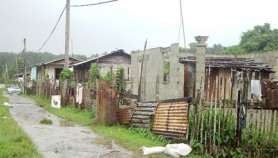
This area comprises mainly single parents who work at Pritipaul Investments. Angela said that she once worked there as well but decided to leave since it left little time for her children. She held the view that the absence of parents was the cause of many youths going astray, since there was no one to guide them.
Having seen a need for someone to watch over the children of working mothers, Angela babysits for the women when they are at work. The money she earns pays for her daughter’s lessons and helps to buy whatever they may need.
Community centre
Over at the Wales Community Centre, the youths and young men gather for a game of cricket and football. This is a daily routine after school for the younger ones. A gym is also housed at the centre. In another room, the participants of the sewing, catering, cake decorating, hair dressing, information technology, carpentry and joinery classes gather for afternoon classes. The programme which offers a certificate from the Adult Education Association of Guyana is organised by the Full Gospel Churches of Patentia, Goed Fortuin and Best and is held six days a week.
It was started in 2006 to give school drop-outs and the less fortunate a chance to learn a skill which they could utilise to develop themselves and keep off the streets. Coordinator, Onika George said that many of the graduates of the programmes had been successful in finding jobs in Georgetown and around the community.
Danny, the barber, has been operating his business for the past ten years. He decided to open his shop to fill a void in the community. He said he found life in Patentia “very nice.” However, like the Pandit, he too said that youths in the area preferred to consume alcohol or smoke cannabis rather than engage in meaningful activities.
“While life is fairly good there is room for improvement, since youths are going astray. It’s a very good place but needs more development.” Pandit Persaud said, “What else can I tell you about our community? It is always like this… quiet and peaceful.”




